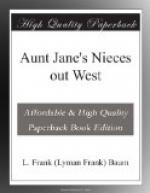“And are you following no other line of defense?” she inquired.
He sat back and regarded the girl curiously for a moment.
“I would like you to suggest some other line of defense,” he replied. “I’ve tried to find one—and failed.”
“Can’t you prove he is not Jack Andrews?”
“Not if the identity of the pearls is established,” said the lawyer. “If the pearls were stolen, and if Jones cannot explain how he obtained possession of them, the evidence is prima facia that he is Jack Andrews, or at least his accomplice. Moreover, his likeness to the photograph is somewhat bewildering, you must admit.”
This gloomy view made them all silent for a time, each thoughtfully considering the matter. Then Maud asked:
“Do you know the cash value of Mr. Jones’ stock in the Continental Film Company?”
Colby shook his head, but Uncle John replied:
“Goldstein told me it is worth millions.”
“Ah!” exclaimed the girl. “There, then, is our proof.”
The lawyer reflected, with knitted brows.
“I confess I don’t quite see your point,” said he.
“How much were those stolen pearls worth?” asked the girl.
“I don’t know.”
“You know they were not worth millions. Jack Andrews was an adventurer, by Le Drieux’s showing; he was a fellow who lived by his wits and generally earned his livelihood by gambling with the scions of wealthy families. Even had he stolen the Countess’ pearls and disposed of the collection at enormous prices—which a thief is usually unable to do—he would still have been utterly unable to purchase a controlling interest in the Continental stock.”
She spoke with quiet assurance, but her statement roused the group to sudden excitement.
“Hooray!” cried Patsy. “There’s your proof, Mr. Colby.”
“The logic of genius,” commented Uncle John.
“Why, it’s proof positive!” said Beth.
“It is certainly a strong argument in favor of the boy’s innocence,” asserted Arthur Weldon.
“Maud’s a wonder when she wakes up. She ought to have been a ’lady detective,’” remarked Flo, regarding her sister admiringly.
Colby, at first startled, was now also regarding Maud Stanton with open admiration; but there was an odd smile on his lips, a smile of indulgent toleration.
“Le Drieux’s statement connects Andrews with two other pearl robberies,” he reminded her. “The necklace of the Princess Lemoine is said to be priceless, and the Grandison collection stolen in London was scarcely less valuable than that of Countess Ahmberg.”
“Allowing all that,” said Mr. Merrick, “two or three hundred thousand dollars would doubtless cover the value of the entire lot. I am quite certain, Mr. Colby, that Miss Stanton’s suggestion will afford you an excellent line of defense.”




